Review: 2025 Lincoln Navigator L Black Label Coddles Like A Spa On Wheels
For as much as it can do while on the move, it’s what the 2025 Lincoln Navigator does while standing still that sets it apart. Lincoln wants you to think of the new Navigator as a spa on wheels and a third space where you can feel at ease.
The Lincoln Rejuvenate feature that’s calming me with the green glow of charged particles from the sun hitting the Earth’s magnetic field is only available when in Park. It’s one of three programs that come standard in every Navigator. The others are Waterfall Meditation with guided voice prompts and The Elements, which cycles through displays featuring water, air, earth, and fire. The system can also turn on the seat heaters/coolers, adjust the lighting and temperature, and play soothing sounds through the audio system. The Navigator isn’t the first vehicle with this type of system. Mercedes has offered a similar system for years in the S-Class and other high-end models. But this is the first application of this type of system in a Lincoln, and the Navigator is the only vehicle in its class with it.
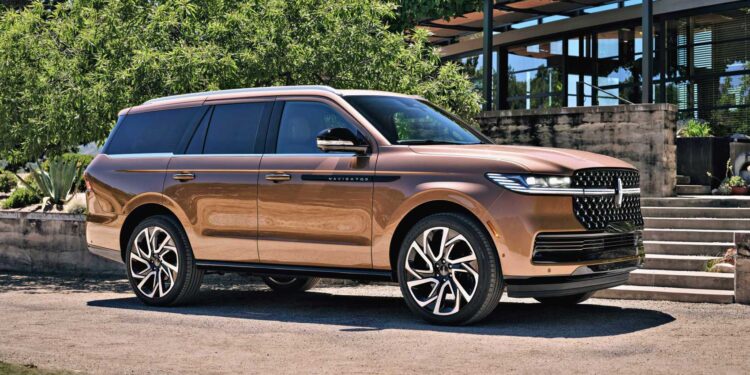
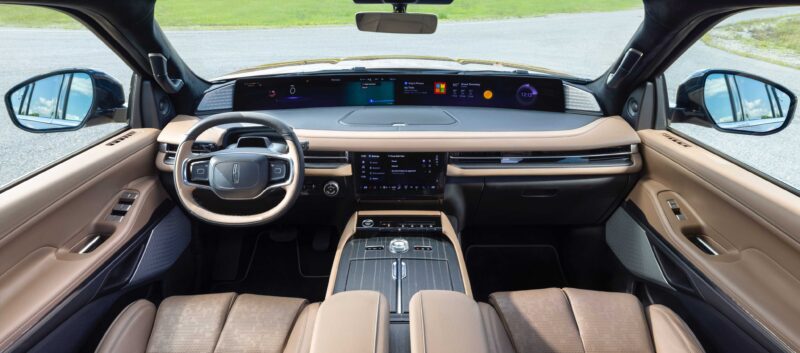
The Navigator offers much more than Rejuvenate to keep occupants comfortable and help them relax, whether at a stop or on the go, especially the top Black Label model I’m driving. It comes standard with a 30-way power-adjustable driver’s seat (a mere 28 ways for the front passenger), heated and ventilated second-row seats, heated third-row seats, a heated steering wheel, power-adjustable pedals, a Revel 28-speaker audio system, a rear-seat entertainment system, power running boards, and three-zone automatic climate control.
The technology stands out even more than the luxury. That 48-inch screen that sits at the base of the windshield serves not only as the digital instrument cluster but also provides a second display for the navigation system. It has three more programmable display areas that can show the trip computer, a towing trip computer, the weather, a compass, the fuel economy, or the media that’s being played.
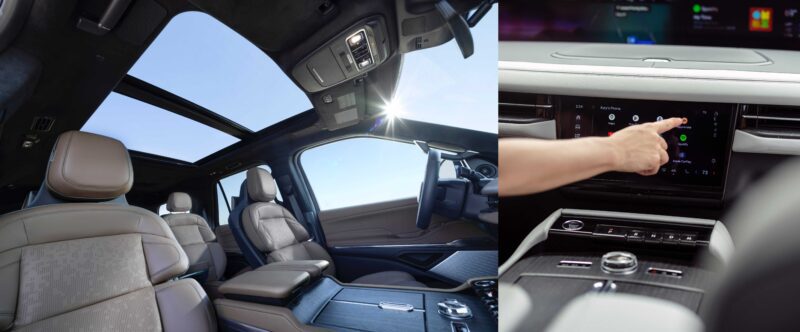
Lincoln also provides an 11.1-inch touchscreen on the lower portion of the dash. It controls what appears on the big screen as well as the normal infotainment functions. Leaving space to view the 48-inch screen required moving the steering wheel out of the way by giving it a small diameter and a flat top and bottom. Rather than looking at the instrument cluster through the steering wheel, drivers see it over the wheel. It’s a somewhat odd layout, but it works, though I prefer a more traditional layout.
The steering wheel is also home to a pair of five-way controllers. The right one handles the power controls for the steering column, mirrors, and pedals, while the left one activates the standard Blue Cruise. One of today’s better highway driver-assist system systems, Blue Cruise allows for miles of hands-free driving, but I’ve had trouble with it deactivating due to glare off my glasses when the sun lies ahead.
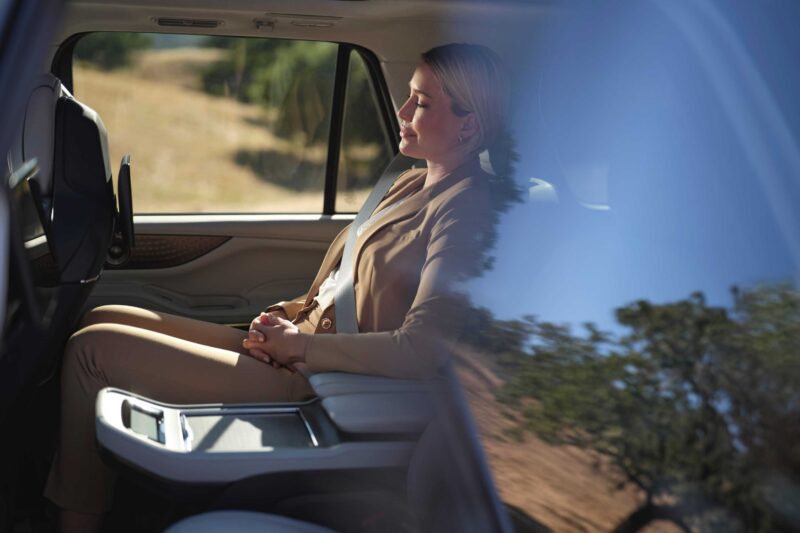
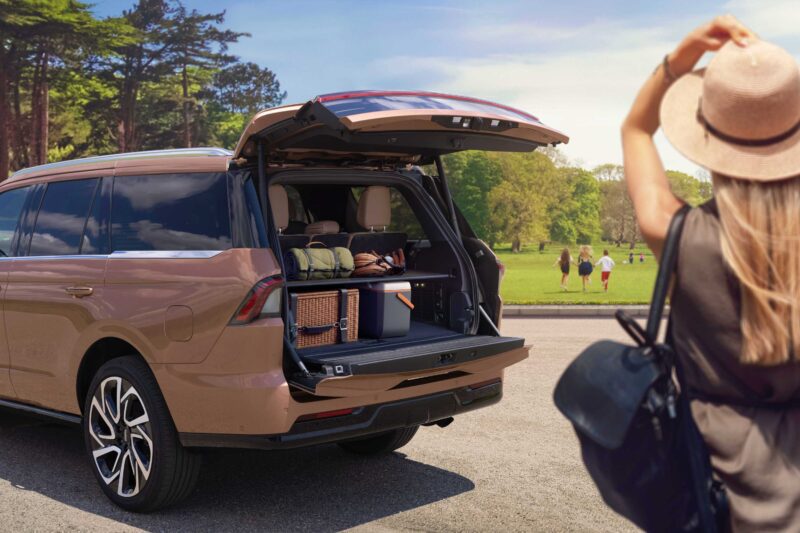
Space remains one of the Navigator’s greatest strengths, especially in the L body style that is a foot longer. It seats seven in comfort. The second-row features captain’s chairs and a small screen to control the temperature, massage function, seat heating and cooling, audio, and lighting. The seats power recline and tilt forward to allow access to one of the best third rows on the market. The power-folding third row drops down to increase cargo space from 36.1 to 75.4 cubic feet, which is accessed by a new split tailgate. That expands to a massive 121.6 cubic feet with the second and third rows down, which is only bested by vans.
This cabin is wrapped in high-quality, purposefully chosen materials. Buyers don’t simply pick a leather color and trim materials. Rather, they choose from three Black Label themes. My tester comes outfitted with the Atmospheric theme, which features Salt Crystal Gray leather with Adobe stitching and a diamond seat pattern, a Salt Crystal Gray synthetic suede headliner, black synthetic suede carpets and floor mats, dark wood interior trim, and aluminum wheels highlighted with Radiant Copper paint.
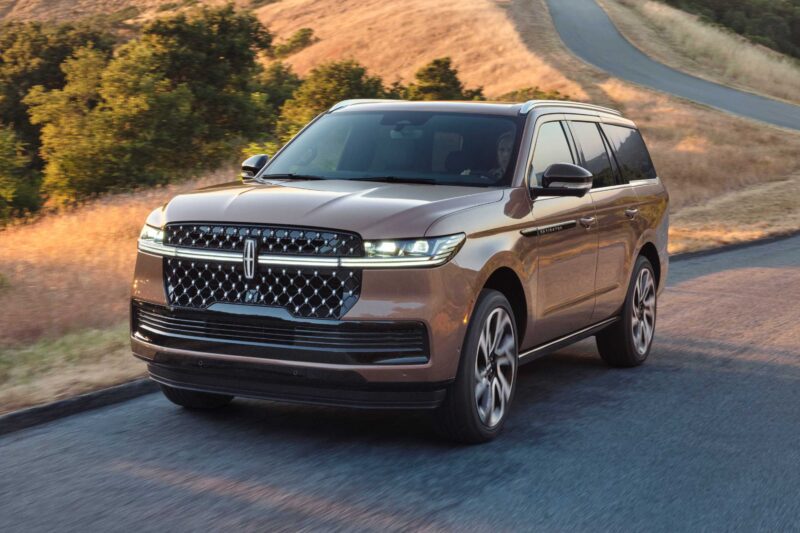
The Navigator remains a truck-like body-on-frame vehicle, and that format is at odds with the interior’s mission to coddle its occupants. This beast weighs in at 6,044 pounds and is engineered to tow up to 8,700 pounds (8,400 with my tester’s 24-inch wheels). The heavy components and sturdy frame give the Navigator a firm, borderline bouncy ride, though the standard adaptive dampers do a good job of quelling excess body quake.
Lincoln tunes the suspension for a firm, controlled ride. That means the body leans less in corners than it will in a Cadillac Escalade, but the ride isn’t as forgiving as the Caddy. Lincoln doesn’t offer advanced suspension components such as air springs or electronically controlled active anti-roll bars that could help the Navigator lean even less. At 231.9 inches long, the Navigator L is a monster on the road and cumbersome in parking lots. Rear-axle steering would be another smart addition to make it easier to park.
Drivers have a choice of seven drive modes that firm up the controls or soften them. No matter the mode, the steering has some welcome heft and is stable on center, and the powertrain always offers plenty of punch.
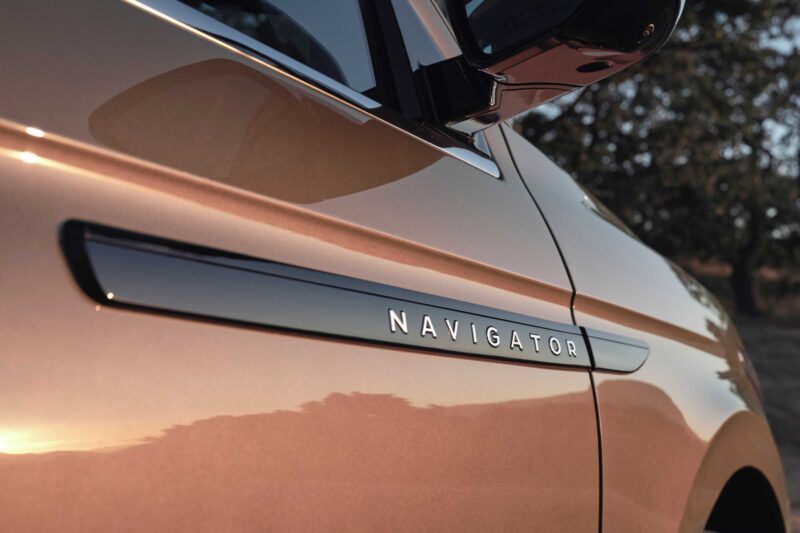
Under the hood lies a twin-turbocharged 3.5-liter V6 that supplies 440 horsepower and 510 pound-feet of torque. It sends its power to all four wheels through a 10-speed automatic transmission, and a two-speed transfer case comes with the standard heavy-duty towing package. The power arrives readily and with a prominent growl that’s unexpected and a little brash for a luxury vehicle. Some buyers may prefer a quieter engine. Of course, with all that power and weight, the Navigator L drinks gas like a sailor on shore leave. It’s EPA rated at 15 mpg city, 22 highway, 17 combined.
The 2025 Lincoln Navigator L Black Label starts at $121,485, including a $1,995 destination fee. For that money buyers get a roomy, powerful, and luxurious vehicle that can carry the family while towing the horse trailer or Airstream. Luxury brands offer more comfortable spas on wheels/relaxing third spaces, but none that offer as much capability as the Navigator L.
View All Lincoln Navigators For Sale
Images Source: Lincoln
Tags: Featured
Related Articles
Mercedes-Benz Vision V Preview: A New Concept For Van Luxury Lifestyle
in Mercedes-Benz News, Reviews
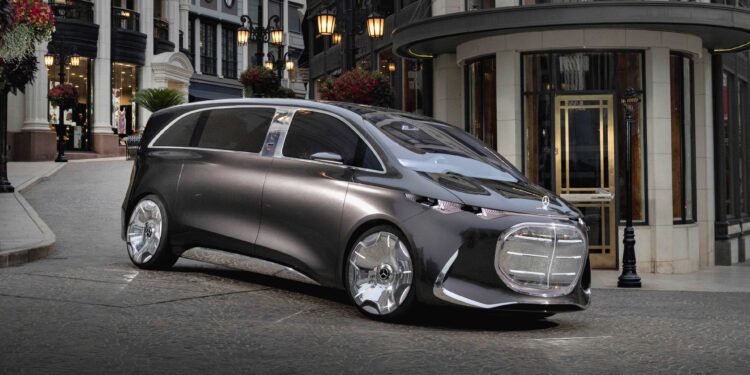
About half the time when I land in Europe for automotive media launch programs, a Mercedes-Benz Metris or V-Class picks me up from the airport. Diesel engine chugging away, stiff suspension sending every last bump in the road straight to my spine, seats that barely recline– at least the air conditioning works, so I don’t overheat after 20 hours of air travel on the typically short trip to a nearby hotel.
Fleet taxis like these represent a perfect application for electric vehicle adoption, thanks to smooth driving dynamics, repeated short journeys interspersed with downtime for charging, and the packaging made possible by skateboard battery layouts. No wonder Mercedes-Benz envisions a global market, and earlier this year, it debuted an all-electric concept van dubbed “Vision V” in Shanghai.
Now, Vision V arrives in the USA for Monterey Car Week 2025, and Mercedes offered select media a chance to preview the concept in Los Angeles the week before. Staged above Dodger Stadium, north of Downtown LA, the van served as a true design exercise, with functional features but not yet ready for journalist driving impressions. So of course, I climbed aboard to fiddle with as many of the screens and seats and nifty tech solutions as possible, while still
knowing that plenty will change – or vanish entirely – by the time the eventual series version reaches production in 2026.
Concept Meets Reality
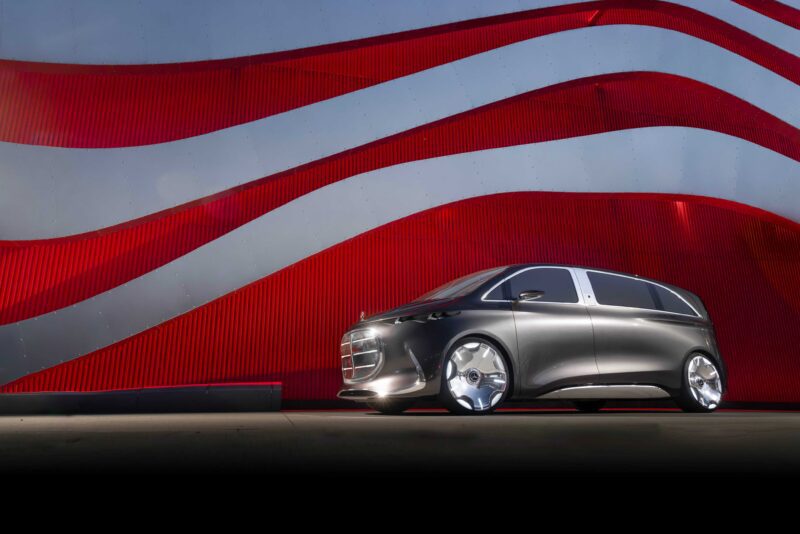
Surprisingly, Mercedes reps on hand insisted that the Vision V very strongly resembles what will come to reality. If so, that design will definitely inaugurate a newly futuristic styling era for vans. An enormous chrome grille dominates the nose, surrounded by 190 illuminated louvers that resemble tiny black-and-white piano keys, as well as another 200 stretching across the recessed headlight bar, complete with tri-star motifs. Above, an illuminated Benz badge gives
way to dual bulges on the “hood” despite the complete lack of an internal combustion engine.
The sides and roofline then swoop backward dramatically. Note the lack of rails for a sliding door or two, for which Mercedes instead invented a nifty hinging system that retracts entirely into the underfloor—both to clean up the exterior styling but also to improve aerodynamics. At the rear, that aero theme continues with 450 more illuminated louvers at the crisp edge of a subtle roof spoiler that’s complemented by a chrome lower diffuser.
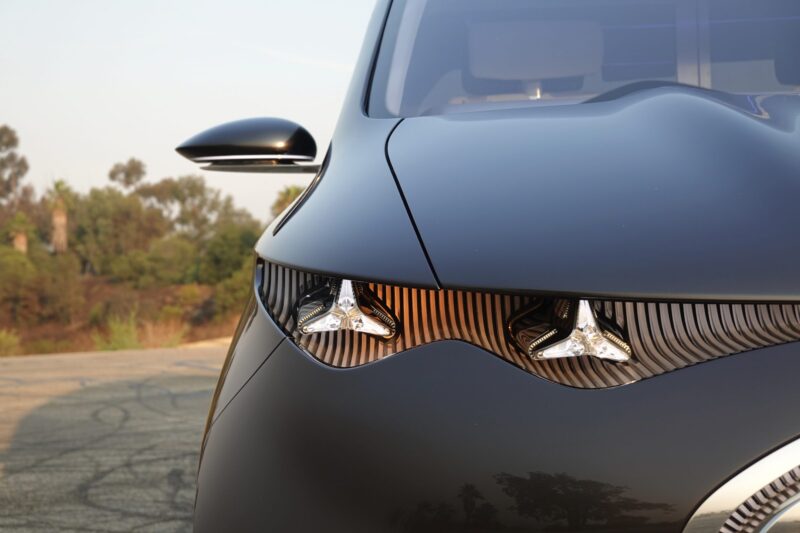
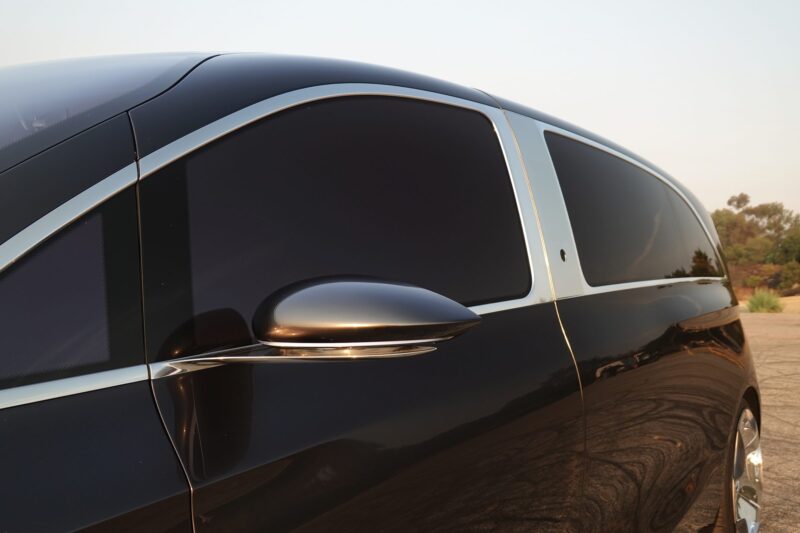
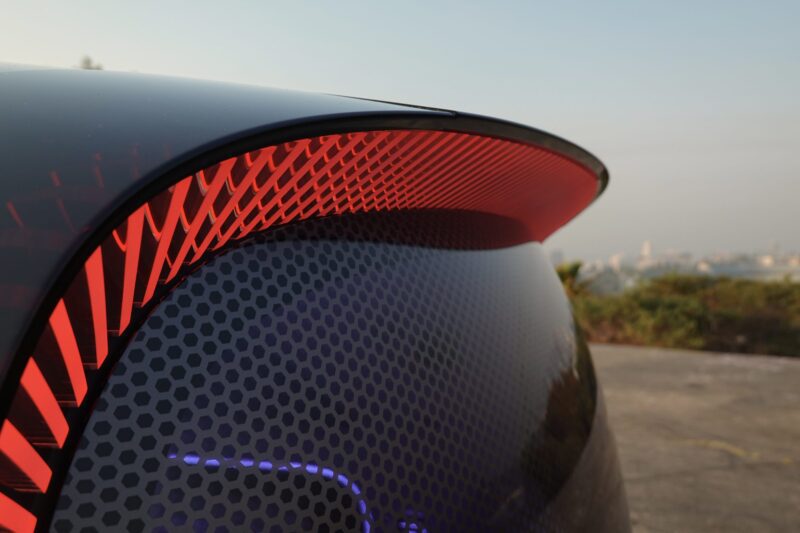
None of the aero elements prioritize downforce, because the Vision V is certainly not a supercar nor a traditional performance vehicle. Instead, performance in this case means range – but Benz declined to share just how good of a coefficient of drag the slick design produces. Which, in turn, suggests how serious the changes to the overall form on the way to a finished production van might be, even if the total exterior dimensions will reportedly measure only fractions of an inch different for everything other than height.
From afar, the design certainly helps to minimize the impression of size: I’d have never guessed the length comes in at a substantial 18 feet, anyway, on a wheelbase of 139 inches. That’s over a foot of wheelbase more than a current S-Class, for context, but under eight inches of added length overall thanks to smaller overhangs past the wheels.
Luxury is Tech, Tech is Luxury
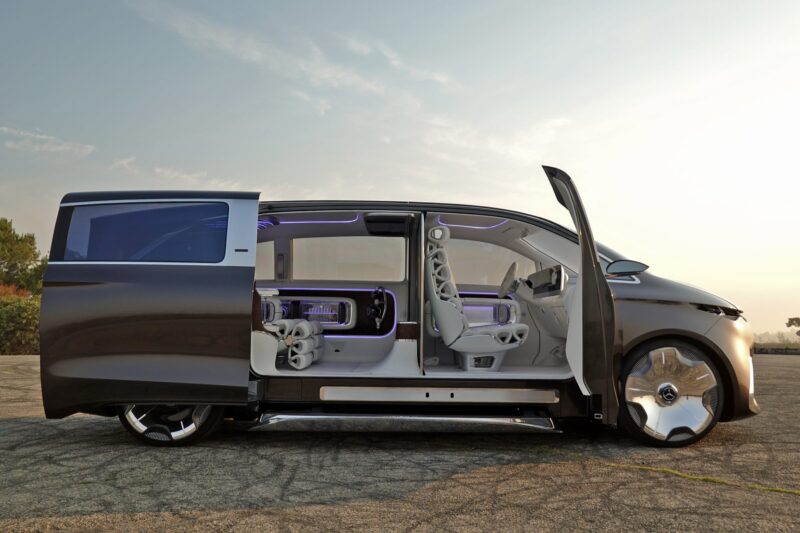
The eventual production versions will skip the infamous EQ naming structure, despite riding three or four inches taller than the Vision V, and will be known as the VLE and VLS. This positions similarly to the GLE and GLS, with the former as more of a people hauler that can seat up to eight, and the latter an executive limousine jam-packed with creature comforts and tech as seen on the concept.
I climbed inside to put a hand on the white Nappa leather and feel the open-pore wood elements of the retro-futuristic aesthetic. Chess pieces in a clear cubby to my left and fine glassware for beverages disappeared from my mind, however, once a massive 65-inch screen unfurled from beneath the floor.
Mercedes calls this rear passenger compartment a “private lounge” and the tech features “interactive worlds.” So the huge screen can obviously play movies and TV shows, while offering a gaming controller setup, online shopping, and even karaoke via a microphone.
A camera hidden into the molding in the ceiling above the screen also allows for video chats– as a further commitment to work-life continuity that Mercedes made possible with a recent Microsoft Teams partnership. But there’s also a calming fireplace mode that drops the screen lower, so that flames become visible beneath the curvature between the floor and pedestal.
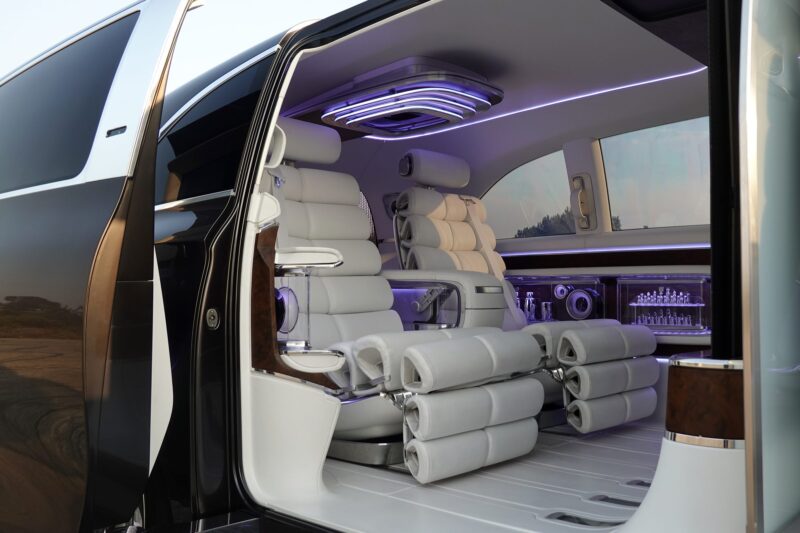
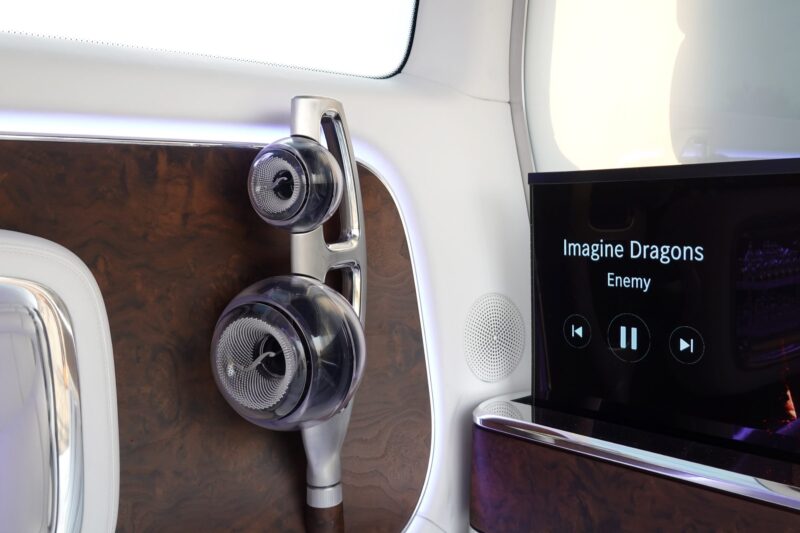
Up to 42 speakers, including in-seat exciters, and seven digital projectors further increase the immersion into an inescapable digital world, though I actually enjoyed a digital detox more by reclining the surprisingly comfortable seats as far as possible.
These cross-cylindrical pads will likely not survive to production, but actually provide a pillowy level of support that works well whether upright or in a nearly flat sleeping mode—great for catching up on shuteye after a long flight while the chauffeur drives, or alternatively while plugged in at a charging station.
So far, the Vision V’s EV range and charging stats remain a mystery. Mercedes declined to specify battery capacity, other than a range target of 300 miles. The skateboard battery will run on an 800-volt architecture; however, to improve charging speeds, and will come in both front- wheel-drive (for efficiency) and 4Matic layouts. Whether that means a single, dual, tri, or quad-motor system also went unanswered.
I can confirm that the vans will use rear-wheel steering to further optimize the skateboard battery’s low center of mass and suspension to make driving as similar to a normal car as possible, rather than a Spartan delivery van. And in the USA, Mercedes plans to use NACS charge ports to enable access to Tesla’s Supercharger network, as on the new electric CLA-Class.
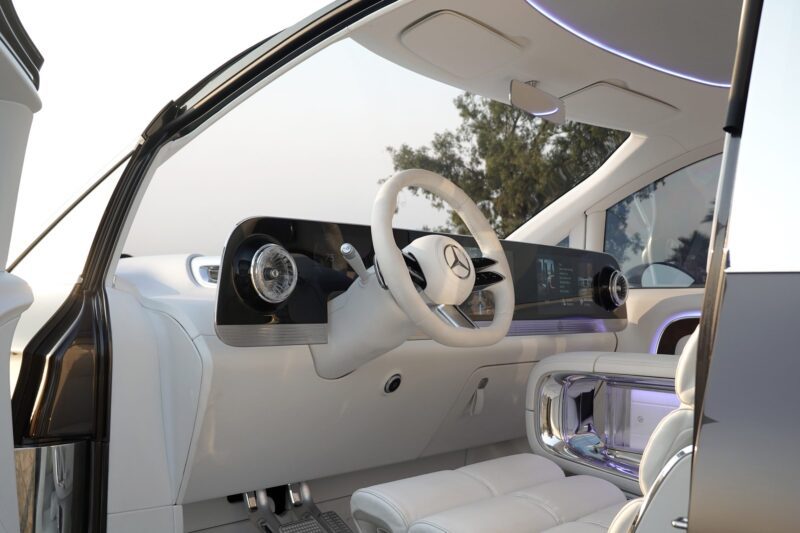
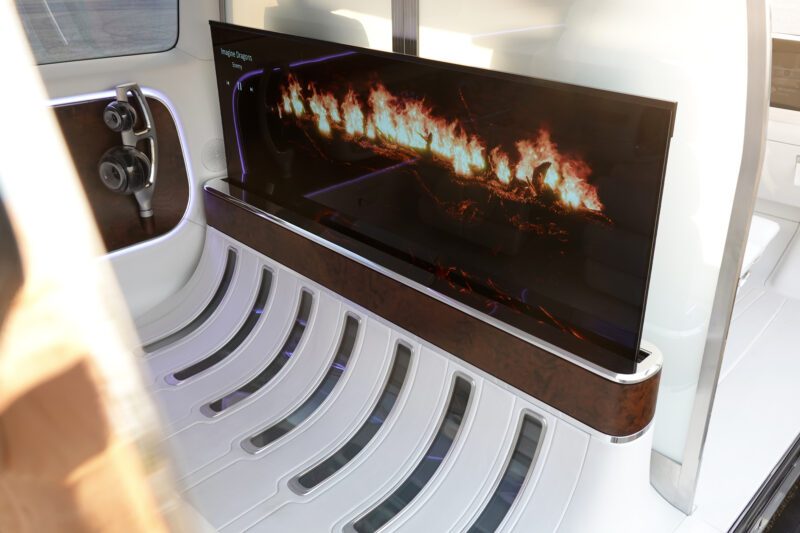
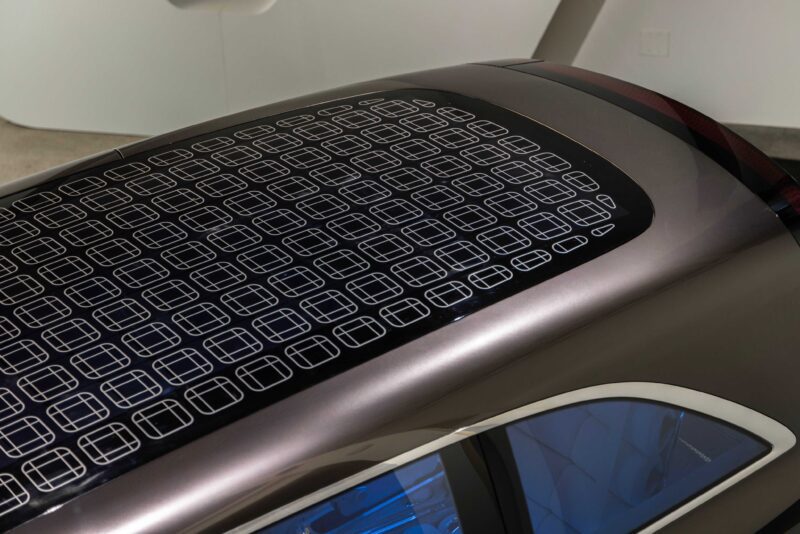
Rear-wheel steering should improve maneuverability in tight European city streets, which helps both fleet drivers and private buyers alike. And the Vision V’s front cockpit looks almost as comfortable as the rear, despite the inability to recline the two seats nearly as far. But plenty of high-tech inclusions hint at a market not just dedicated to the chauffeur and taxi driver.
For Mercedes, that means a ton of screen, or the infamous three “Superscreen” displays that stretch all the way across the dash. But luxury touches throughout include the similar seats, metal throttle and brake pedals, and glass cases in the doors that match the rear’s—for holding sunglasses, this time, not champagne flutes.
Separating the rear passenger compartment from the front, an expansive liquid-crystal pane of glass can switch from clear to opaque in milliseconds. The same goes for the side windows, while the roof gets a full canopy shade. And the roof even features 168 solar cells, which can charge at rates up to 539 watts.
Converting that to as much as 3.44 kilowatt-hours on a sunny day means that the roof alone might contribute to low double-digit range increases without ever plugging into a charge station – enough for many drivers who only commute short distances to and from work. Can the Vision V Revive Van Life in the USA?
Can the Vision V Revive Van Life in the USA?
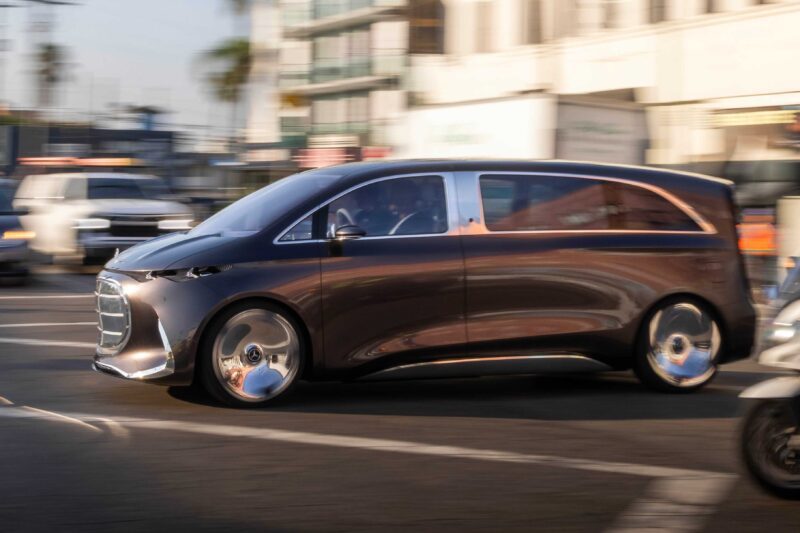
To my eye, the Vision V caters less to a private buyer, and barely even to the American market. Here, luxury hired cars will probably switch over from ubiquitous Escalades to GM’s own massive EV, the Escalade IQ. The more widespread acceptance of chauffeured vans in both Europe and Asia seems more ripe for the Vision V to succeed.
I also left the preview surprised at how little the Vision V prioritized autonomous driving capabilities, in the era of Waymo and Zoox, and Tesla’s “any day now” Robotaxi. Mercedes arguably leads the industry with the only Level 3, or truly hands-free, driving system available on the market as an option on the S-Class and EQS since model year 2024. The fact that this concept van even includes a steering wheel, therefore signals that perhaps Mercedes still views
full autonomy as far enough in the future that it’s still worth developing a whole new vehicle platform in the interim period.
Suffice to say, the Vision V raised as many questions as any typical concept car—or even more, given the unique nature of a futuristic electric van. Regardless of exactly how much of the design and technology eventually survives to the production VLE or VLS, I fully expect to get picked up in an electric Mercedes van for those airport transfers starting regularly just next year.



